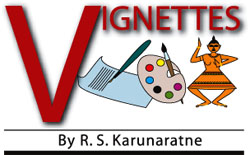
Ssh, 'Singlish' is expanding
"I am having a splitting headache."
"She met me at about 5 p.m."
"Please write the caption on the backside of the envelope."
"Can you drink one milk bottle at a time?"
"I enjoyed thoroughly at the party yesterday."
"The minister gave a long speech."
"Put your sign on the dotted line."
"The elephant was shot by a double barrel rifle."
These are some of the utterances I hear in offices, trains, buses and
English classes. Obviously the speakers do not know that they are
speaking "Singlish." They may have picked up their language in schools
or private tuition classes.
A few days ago I went to a private dispensary to consult a doctor.
Dr. S was not available. As there was no queue I went into a cubicle and
sat in front of a young doctor. He examined me with his stethoscope and
asked me what was wrong.
"I have constipation. I didn't go to the toilet for three days. Now I
have a severe headache and I feel uncomfortable."
"OK. I don't think there's anything serious. I'll give you some
tablets and a mixture. You'll be all right."
Then he handed me some tablets and told me how to take them. I
casually asked him whether I would be able to go to office after taking
the tablets.
"Don't worry," the doctor assured me." When you take the tablets
you'll get diarrhoea."
It's strange that the young doctor didn't know the meaning of
diarrhoea. Anyway I did not take the medicine because diarrhoea is
another disease!
Apart from English speakers who brazenly flout grammatical rules and
syntax, advertising fraternity are making a mockery of English. I think
the readers are quite familiar with the following advertisements:
"Season ekata Nuwara Eliya yanakota People's Visa Card eka aragena
yanna." "More katha more sina."
"Karadaraless phone."
Someone who does not have even a nodding acquaintance of Sinhala will
find it hard to get at the meaning of these advertisements. It is a moot
point to consider whether we are in the process of evolving a hybrid
language only a few could understand.
While the British Council and other reputed colleges are making a
concerted effort to teach Queen's English, wayside tutories are making a
fast buck teaching "Singlish." Once an Indian student was asked by his
teacher to pronounce English words without drawling.
The student snapped back: "Sir, is it correct for 50 million speakers
of English to impose their will on 350 million English speakers in the
sub continent?" Very soon, Sri Lankan students will ask the same
question: "What is this non-sense called Standard English, BBC English
or Queens English? Can't we use the English language the way we want?"
Those who have the privilege of following elocution classes and
attending well-known schools try to speak the real English. However,
they appear to be in a minority in the English speaking world. American
English has already penetrated the bastions of standard British English
by way of Coke, Levis and McDonalds.
As a result, English has become the most popular and malleable
language in the world.
Alarm bells have been sounded on the possible degeneration of English
into a drawl of Americanism. However, noted American writer Tony Tanner
has dismissed such fears. He says English can look after itself.
Defending American English he says American literature is a way of
writing that shows the liveliness of speech.
The articles appearing in the national press and magazines show how
the English language has been abused. A university don who migrated to
Australia once told me that our literary horizons had been invaded by "sesquipedalians",
a word not found in average dictionaries. It means people who write to
impress readers with jaw-breaking words.
The tendency to use high-sounding long words had been condemned even
in the past. Coming back to spoken English, we see a wide variety.
Indian English is sometimes called "Inglish." For instance, Indians ask
one another their "good names"; officials promise to "do the needful"
and they "peruse" instead of reading. Thus, "Inglish" is somewhat
artificial, ornate and bookish."
Similarly, Tamilian English is referred to as "Tinglish". Once a
Tamil official in India wrote a letter asking for leave in the following
manner.
"As I have to attend to a mythological function I may be granted
leave to which I am due."
Then there is "Hinglish", the kind of English spoken by Hindi
speakers. Seeing a well-dressed woman, someone from Uttar Pradesh is
reported to have said, "That fashionable lady will definitely take our
country to the international fashion map."
While Maharashtrians speak "Minglish", my Gujarati friend speaks "Ginglish."
Similarly, we speak "Singlish" in Sri Lanka. Where else do you hear
expressions such as "I'll go and come." or "My friend don't care?"
On hearing such expressions learned men may raise their eyebrows.
However, when Americans pronounce "schedule" as skejule" or "lieutenant"
as "lootenant," we do not laugh at them.
Before laughing at others, we have to remember that English itself is
an illogical language. English people say, "You can't have your cake and
eat it." This is an illogical statement.
Why can't you have a cake and eat it? However, we are not in a
position to change the English usage. If the majority of English
speakers do not quarrel with such expressions, we have only to accept
them as correct.
The latest trend we see in Colombo and the suburbs is the deliberate
use of more than one language. "Ah-daraya" would be Greek to an
Englishman but it means "love."
Similarly, "hungry-da?" sounds Italian, but it means "Ar you hungry?"
So "Singlish" is something that is coming up fast and furiously. Can
we use it along with standard English? How far can we tolerate "Singlish?"
These are some of the questions we cannot answer immediately. |
